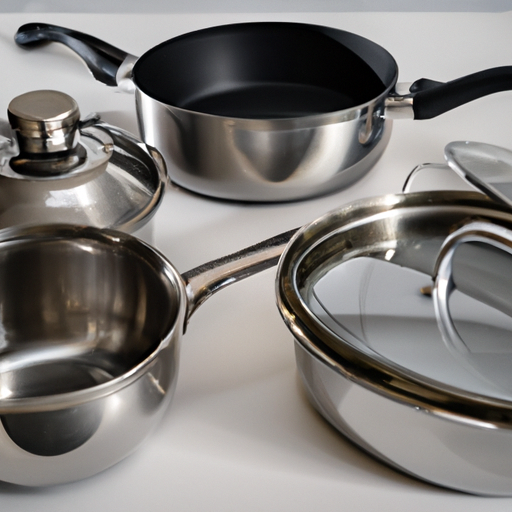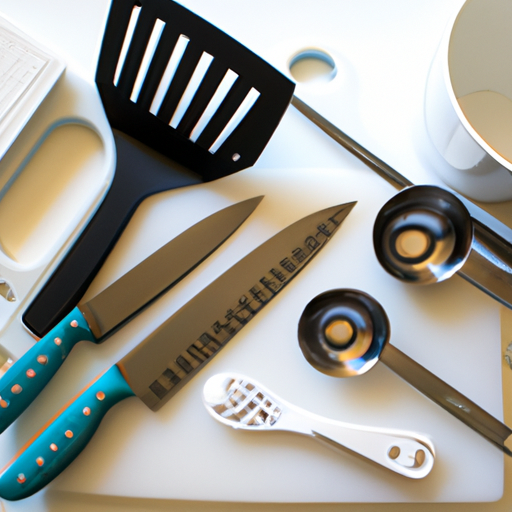Foodie123
These cookware tips have really improved my cooking experience. Thank you!

The first step in building a well-equipped kitchen is choosing the right cookware. Consider the type of cooking you do most frequently and invest in high-quality pots and pans that will suit your needs. Stainless steel cookware is versatile and durable, while non-stick pans are great for low-fat cooking. Cast iron pans offer excellent heat retention and are perfect for searing and braising. Research different materials and their benefits to make informed decisions.
Having the right utensils can make a significant difference in your cooking process. Some essential kitchen utensils include a chef's knife, a cutting board, a set of measuring cups and spoons, a whisk, a spatula, and tongs. These tools will help you perform a wide range of cooking tasks efficiently. Invest in high-quality utensils that are comfortable to use and built to last.
Taking care of your cookware is essential to prolong its lifespan and maintain its performance. Always follow the manufacturer's instructions for cleaning and storing your pots and pans. Avoid using harsh abrasives that can damage the surface. For non-stick pans, use wooden or silicone utensils to prevent scratching. Regularly inspect your cookware for any signs of wear and tear and replace them if necessary.
Proper heat distribution is crucial for achieving optimal cooking results. Before cooking, preheatthe pan on medium heat for a few minutes to ensure even heat distribution. Avoid overcrowding the pan, as it can lead to uneven cooking. When using a gas stove, match the size of the pan to the burner to prevent heat loss. For electric stoves, use flat-bottomed pans that make direct contact with the heating element. By maximizing heat distribution, you'll be able to cook your food more evenly and efficiently.
Non-stick cookware is popular for its convenience and easy cleanup. To maintain the non-stick coating, avoid using metal utensils that can scratch the surface. Instead, use wooden, silicone, or plastic utensils. Avoid using high heat with non-stick pans, as excessive heat can damage the coating. When cleaning, use a soft sponge or cloth and mild dish soap. Never use abrasive cleaners or scrubbers that can strip away the non-stick coating.

| Cookware Material | Advantages | Disadvantages |
|---|---|---|
| Stainless Steel | Versatile, durable, and non-reactive | Poor heat distribution |
| Non-Stick | Easy food release and cleanup | Prone to scratching and limited high-heat usage |
| Cast Iron | Excellent heat retention and even cooking | Requires seasoning and can be heavy |
| Copper | Superior heat conductivity and precise temperature control | Expensive and requires regular polishing |
| Aluminum | Lightweight and excellent heat conductivity | Reacts with acidic foods and can warp easily |
By following these cookware tips, you can enhance your cooking experience and ensure the longevity of your kitchen equipment. Remember to choose the right cookware, invest in essential utensils, practice proper maintenance, maximize heat distribution, and handle non-stick cookware with care. With the right tools and knowledge, you'll be well-equipped to create delicious meals in your kitchen.
Foodie123
These cookware tips have really improved my cooking experience. Thank you!
HomeCookingQueen
As someone who loves cooking, I found this article to be incredibly helpful. The tips are practical and easy to implement.
CookingNovice
I learned a lot about different cookware materials and their advantages. However, I wish there were more tips on maintenance.
GourmetChef
Douglas Parisian's expertise shines through in this article. I appreciate the detailed explanations and recommendations.
FoodieFanatic
I've always struggled with maintaining the non-stick coating on my pans. The tips provided here have made a noticeable difference. Thank you!
|
|
Douglas Parisian is a professional chef with over 10 years of experience in the culinary industry. He specializes in cookware selection, maintenance, and usage. Through his expertise, he aims to help home cooks make the most out of their kitchen equipment and elevate their cooking skills. |